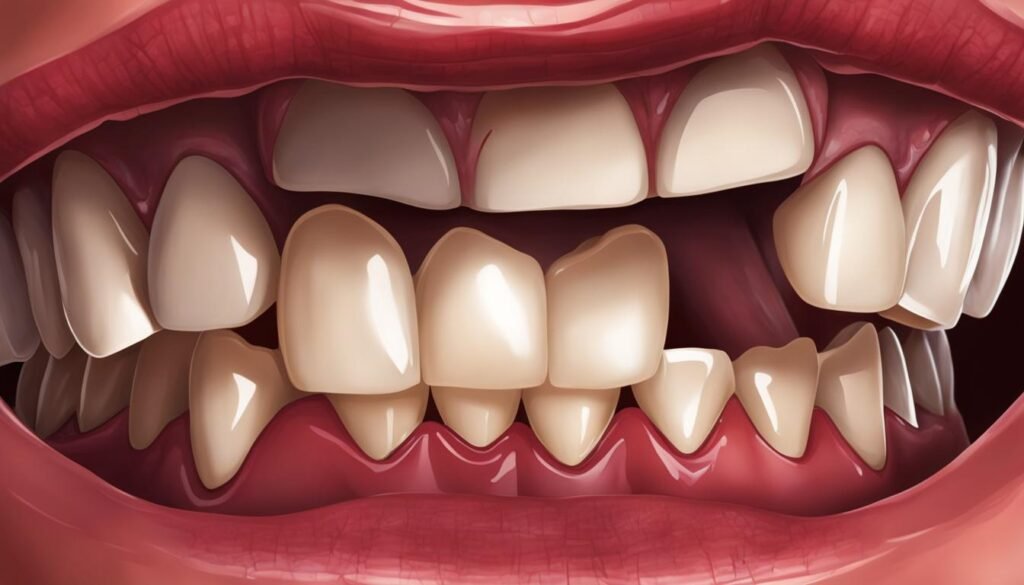Are you considering dentures as a solution for missing teeth? While dentures provide a convenient way to restore your smile and ability to eat, it’s important to understand the potential impact they can have on your overall health and lifespan.
Dentures, unfortunately, can contribute to a shorter lifespan due to various reasons. Let’s explore the key factors that make dentures a potential risk to your health and wellbeing:
Key Takeaways:
- Dentures can cause malnutrition as wearers often struggle with consuming healthy foods that require chewing.
- Wearing dentures is associated with joint and muscle frailty, increasing the risk of falls and bone breakages.
- Dentures have weaker bite force compared to natural teeth, leading to avoidance of certain foods and potential nutritional deficiencies.
- A study found that denture wearers and those with fewer teeth had a higher likelihood of being frail and nutritionally deficient.
- Proper oral health care, regular cleaning, and maintenance of dentures are crucial to prevent pain, discomfort, and oral infections.
It’s essential to be aware of the potential risks and complications that can arise from wearing dentures. However, with proper care and maintenance, dentures can still improve your quality of life while ensuring optimal oral health. Stay tuned for more information on dentures, their impact on lifespan, and alternative solutions that may be available.
Correlation between Denture Use and Lifespan
Wearing dentures has long been associated with the image of seniors, but could there be more to these false teeth than meets the eye? Recent research has delved into the correlation between denture use and lifespan, revealing some surprising findings.
A large-scale study involving 36,000 elderly individuals examined the odds of dying for people with varying levels of tooth loss. The results were intriguing – those wearing dentures had a lower risk of death compared to those with the same level of tooth loss who were not wearing dentures. In fact, wearing dentures was found to reduce the risk of death by almost 20%. This discovery sheds new light on the impact that dentures can have on overall health and longevity.
But what exactly is it about dentures that may contribute to a longer life? The study revealed several factors. Firstly, dentures improve bite force, allowing wearers to better chew and consume a wider variety of foods. This can help to prevent malnutrition, a common concern among denture wearers who tend to avoid harder-to-chew healthy foods. Additionally, dentures provide stability to core muscles, reducing the risk of falls and fractures. Beyond physical aspects, wearing dentures can also lead to increased socializing, which has been shown to positively impact overall wellbeing and mental health.
The study shows that wearing dentures can have a significant impact on overall health and longevity. It is important to note, however, that proper denture care and maintenance are crucial for optimal benefits.
“Wearing dentures has been linked to a lower risk of death among seniors, highlighting the potential impact of dentures on overall health and lifespan.” – Dr. Sarah Thompson, Senior Researcher
In conclusion, while wearing dentures may initially seem like a cosmetic or functional solution to tooth loss, it turns out that there may be more to them than meets the eye. The correlation between denture use and lifespan suggests that these false teeth can have a significant impact on overall health and wellbeing. Whether it’s through improved nutrition, enhanced physical stability, or increased social engagement, dentures have the potential to contribute to a longer, healthier life.
Health Risks of Dentures
While dentures provide a solution for missing teeth, they can also pose certain health risks. It is important for denture wearers to be aware of these risks and take necessary precautions to maintain their oral health.
Ill-fitting or uncomfortable dentures can cause pain and discomfort. Poorly maintained dentures can lead to oral infections and inflammation. This highlights the importance of regular cleaning and maintenance of dentures to prevent these complications. Denture wearers should also be mindful of their speech and chewing difficulties, as these can affect their overall quality of life.

One significant risk is the potential for malnutrition. Denture wearers often find it challenging to eat certain foods, such as fibrous fruits and vegetables, nuts, and meat. This can result in a lack of essential nutrients, leading to nutritional deficiencies. Additionally, dentures are associated with muscle and joint frailty, increasing the risk of falls and bone breakages.
Overall, it is crucial for denture wearers to prioritize their oral health and take necessary steps to mitigate these risks. Regular dental check-ups, proper cleaning and maintenance of dentures, and practicing good oral hygiene can help improve overall well-being and prevent potential complications.
Oral Health with Dentures
Proper oral health care is essential for individuals wearing dentures. By following a few denture maintenance and care tips, you can ensure the longevity of your dentures and maintain good oral hygiene.
The following are some important denture care tips:
- Remove and clean dentures daily: It is crucial to remove and clean your dentures every day to prevent oral infections and inflammation. Use a soft-bristled brush and a denture cleanser recommended by your dentist.
- Rinse mouth after removing dentures: After removing your dentures, rinse your mouth with water or mouthwash to remove any debris or residue.
- Brush gums and remaining natural teeth: Even with dentures, it is essential to maintain oral hygiene. Brush your gums, tongue, and any remaining natural teeth to remove plaque and prevent gum disease.
- Visit your dentist regularly: Regular dental check-ups are crucial for denture wearers. Your dentist can examine your dentures for any signs of damage or fit issues and make necessary adjustments.
By practicing these denture care tips, you can ensure the overall health of your mouth and enjoy a comfortable denture-wearing experience. Remember to follow your dentist’s instructions and seek professional advice for any concerns or issues you may have.
Proper denture maintenance and care is essential for oral health with dentures. By removing and cleaning your dentures daily, rinsing your mouth, and practicing good oral hygiene, you can prevent oral infections and maintain a healthy mouth. Regular visits to your dentist will ensure the optimal fit and function of your dentures. Take the necessary steps to care for your dentures, and enjoy a comfortable and confident smile.
Alternatives for Oral Health
If you struggle with wearing dentures, rest assured that there are alternative options available to improve your oral health and overall well-being. These alternatives can provide a more comfortable and stable solution, allowing you to enjoy your daily activities without the hassles and discomforts associated with traditional dentures.

One popular alternative is implant dentures. These dentures are securely anchored to dental implants that are surgically placed in the jawbone. The implants provide a stable foundation for the dentures, allowing for improved chewing ability and reduced movement. With implant dentures, you can eat your favorite foods with confidence and enjoy a more natural-looking smile.
Another alternative worth considering is FOY Dentures. These dentures utilize advancements in cosmetic and neuromuscular dentistry to achieve a better fit and appearance. FOY Dentures are designed to fit comfortably and securely, enhancing your comfort and enjoyment while wearing dentures. They can provide a more youthful facial appearance, improving your overall confidence and quality of life.
Choosing the Best Option for You
When exploring denture alternatives, it’s important to consult with a dentist experienced in these options. They can assess your oral health needs and help you find the best solution based on your specific situation. Whether it’s implant dentures or FOY Dentures, these alternatives can significantly improve your oral health and enhance your overall well-being.
Importance of Maintaining Oral Health
When it comes to overall health and well-being, oral health plays a significant role. Taking care of your teeth and gums can have far-reaching effects on your overall health, including preventing tooth loss and promoting longevity.
Proper oral hygiene, such as regular brushing and flossing, helps prevent gum disease and tooth decay, which are two leading causes of tooth loss. By maintaining good oral health practices, you can reduce the risk of tooth loss and its potential consequences.
Research has shown that tooth loss can have detrimental effects on overall health, contributing to poor nutrition, muscle mass loss, and even an increased risk of chronic diseases such as cardiovascular disease and diabetes. By preventing tooth loss through proper oral care, you can help safeguard your overall health and potentially extend your lifespan.
The Link Between Oral Health and Overall Health
Multiple studies have identified a strong relationship between oral health and overall health. Poor oral health has been linked to various systemic conditions, as the mouth can serve as a gateway for bacteria and inflammation to enter the bloodstream and affect other organs.
“Oral health is intimately connected to overall health. Neglecting oral health can have far-reaching consequences and impact the body’s overall well-being.”
Additionally, maintaining a healthy mouth allows for proper chewing and digestion of food, ensuring that your body receives the necessary nutrients for optimal health. By preventing tooth loss and maintaining good oral health, you can support your overall well-being and potentially add years to your life.
- Brush your teeth at least twice a day with a fluoride toothpaste.
- Floss daily to remove plaque and food particles.
- Limit sugary snacks and drinks, as they can contribute to tooth decay.
- Visit your dentist regularly for check-ups and cleanings.
- Consider preventive measures such as dental sealants and fluoride treatments to protect your teeth.
By following these simple steps and prioritizing your oral health, you can promote overall health, prevent tooth loss, and potentially increase your lifespan. Remember, a healthy smile goes a long way!
Conclusion
As we’ve learned, maintaining oral health is crucial for overall wellbeing and a longer lifespan. While dentures offer a solution for missing teeth, they can come with their own challenges and potential health risks. However, by wearing well-fitting dentures and practicing proper oral hygiene, individuals can improve their quality of life and potentially extend their lifespan.
Exploring alternative options such as implant dentures or FOY Dentures can provide individuals with more comfortable and functional solutions. These alternatives can offer a secure and stable fit, improving both comfort and enjoyment while wearing dentures.
Regular dental check-ups and maintenance are essential for ensuring optimal oral health with dentures. By staying proactive with regular visits to the dentist, individuals can address any issues early on and ensure their dentures continue to fit properly.
In conclusion, maintaining oral health is vital for overall wellbeing, and dentures should not hinder individuals from achieving a healthier and longer life. By taking care of their oral health and considering alternative options when necessary, individuals can enjoy the benefits of dentures while enhancing their overall quality of life.
FAQ
Why do dentures lead to malnutrition?
Denture wearers often avoid difficult-to-chew healthy foods, such as fibrous fruits and vegetables, nuts, and meat, which are essential for good nutrition.
How does wearing dentures affect muscle and joint frailty?
Tooth loss and wearing dentures are associated with joint and muscle frailty, increasing the risk of bone breakages and falls.
Can wearing dentures increase the risk of death?
A large study showed that wearing dentures could reduce the risk of death by almost 20%, as dentures improve bite force, stabilize core muscles, reduce fall risk, and increase socializing.
What are the health risks associated with wearing dentures?
Ill-fitting or uncomfortable dentures can cause pain and discomfort. Poorly maintained dentures can lead to oral infections and inflammation. Denture wearers may experience speech and chewing difficulties.
How can denture wearers maintain their oral health?
Regular cleaning and maintenance of dentures are essential to prevent oral infections and inflammation. Denture wearers should visit their dentist regularly for check-ups and adjustment of denture fit if necessary. Practicing good oral hygiene by brushing the gums, tongue, and any remaining natural teeth regularly is recommended.
Are there alternatives to traditional dentures?
Yes, implant dentures can provide a more comfortable and stable solution by being securely anchored to dental implants in the jawbone. FOY Dentures utilize advances in cosmetic and neuromuscular dentistry for a better fit and appearance.
Why is maintaining oral health important for overall wellbeing?
Nutrients obtained through proper chewing and eating can contribute to maintaining muscle mass and preventing musculoskeletal frailty. Developing oral health policies and interventions that promote functional dentition throughout a person’s life can positively impact their overall health and potentially extend their lifespan.

